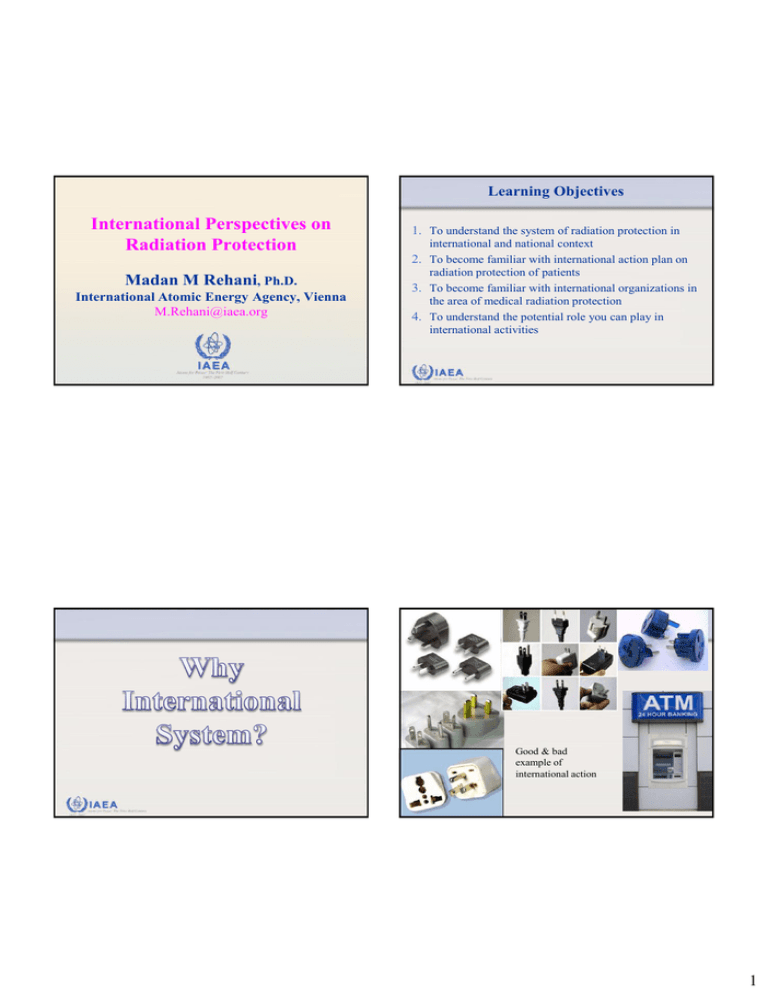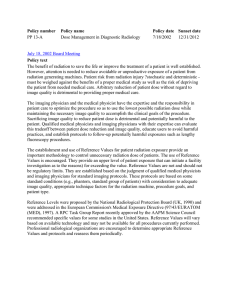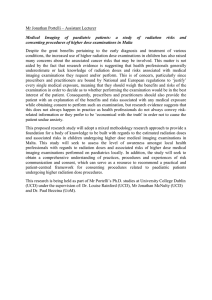International Perspectives on Radiation Protection Learning Objectives 1.
advertisement

Learning Objectives International Perspectives on Radiation Protection 1. To understand the system of radiation protection in international and national context 2. To become familiar with international action plan on Madan M Rehani, Ph.D. International Atomic Energy Agency, Vienna M.Rehani@iaea.org radiation protection of patients 3. To become familiar with international organizations in the area of medical radiation protection 4. To understand the potential role you can play in international activities Good & bad example of international action 1 Examples in Radiation Protection • Global acceptance of concepts and principles of radiation protection as developed by the International Commission on Radiological Protection (ICRP) such as justification, optimization and dose limitation. • Conversely Radiation Protection of Patients Universal agreement • No dose limits and • Concept of diagnostic reference levels (DRLs) to be used with flexibility. • dose limits for workers and members of the public, and • acceptance of SI units e.g. Sv and Gy against rem and rad. International Actions are needed Besides harmonization, to • Give impetus to some areas (mammography screening, exposure tracking…) • Raise awareness about emerging issues (breast radio-sensitivity, cataract..) • Forewarn about upcoming dangers if actions are not International Actions • For example, the growing use of computed tomography (CT) and over-exposures in developed country has alerted other countries that they may face the same situation in future years initiated well in time. 2 Organisations in the Cosmic Scheme The Basis for the International Safety Standards Basic Scientific Studies UNSCEAR (*) Scientific Evaluations (UNSCEAR, BEIR etc.) RADIATION EFFECTS STANDARDS (IAEA) ICRP Recommendations Regional (PAHO, EC, NEA) & Topical (ILO, WHO, FAO) Stand’s International Safety Standards: BSS (IAEA) National Regulations Industry Stand’s (ISO, IEC) Demonstration of Compliance ICRP (**) PRINCIPLES AND RECOMMENDATIONS (*) United Nations Scientific Committee on the Effects of Atomic Radiation (**) International Commission on Radiological Protection What people know MOST UNSCEAR (*) RADIATION EFFECTS ICRP (**) PRINCIPLES AND RECOMMENDATIONS A matter of interpretation ICRP--- Dose limits IAEA--- Iran, Iraq actions UNSCEAR---?? STANDARDS (IAEA) 3 What you think that they do? Probably what you wish to know is ICRP • Establishes principles of radiation • How International organizations work? • What are their individual mandates? • How they cooperate to prepare International protection • Provides protection philosophy IAEA • Has programs for promoting system? • Is international system mandatory for Member States? • Application of Standards. • Nuclear medicine, radiotherapy and medical physics • Radiation protection of patients UNSCEAR • UNSCEAR was established by the General Assembly of the United Nations in 1955. • Its mandate in the United Nations system is to assess and report levels and effects of exposure to ionizing radiation. • Governments and organizations throughout the world rely on the Committee's estimates as the scientific basis for evaluating radiation risk and for establishing protective measures. UNSCEAR • The original committee was composed of senior • • • • scientists from 15 designated UN Member States, namely Argentina, Australia, Belgium, Brazil, Canada, Czechoslovakia, Egypt, France, India, Japan, Mexico, Sweden, the UK, the USA and the USSR. Currently 21 countries Last report 2008 HQ in Vienna Meeting once every year 4 ICRP Independent Charity Established to advance for the public benefit the science of Radiological Protection, in particular by providing recommendations and guidance on all aspects of protection against ionising radiation IAEA Independent international organisation under UN family Pillars: Safety and Security; Science and Technology; and Safeguards and Verification. Current Membership Main Commission C1 C2 C3 C4 C5 Task Groups (TG) Working Parties (WP) Budget: $300,000 ICRP Committee 3 (as in 2011) EliseoVañó(Chair) MadanRehani (Secretary) KatrineÅhlströmRiklund Jean-Marc Cosset Lawrence T. Dauer Mario Baeza Igor Gusev John Hopewell Pek-LanKhong Pedro Ortiz Lopez SörenMattsson Donald L. Miller Hans Ringertz Marvin Rosenstein Yoshiharu Yonekura BaorongYue 5 Tissue weighting factors Changes in occupational Dose Limit (ICRP) mSv/yr 500 450 400 350 300 250 200 150 100 50 0 ICRP 26 (1977) WT 0.25 0.15 0.12 ICRP 60 (1991) WT 0.20 0.05 0.12 ICRP 103 (2007) WT 0.08 0.12 0.12 0.12 0.03 0.03 0.12 0.05 0.01 0.12 0.04 0.01 Colon Stomach Bladder Oesophagus - 0.12 0.12 0.05 0.05 0.12 0.12 0.04 0.04 Liver Skin Brain Salivary glands - 0.05 0.01 0.04 0.01 0.01 0.01 0.30* 0.05** 0.12 Gonads Breast Red bone marrow Lung Thyroid Bone surface 1931 1947 1977 1990 Remainder Year Remainder in Tissue weighting factors Remainder organs Stomach, lower large intestine, salivary glands, liver Adrenals, brain, upper large intestine, small intestine, kidney, muscle, pancreas, spleen, thymus, uterus Adrenals, extrathoracic (ET) region, gall bladder, heart, kidney, *When the lymphatic nodes, gastrointestinal tract muscle, oral mucosa, is irradiated, the pancreas, prostate stomach, small **When one of (♂), small intestine, intestine, lower large remainder tissues spleen, thymus, intestine and upper receives an equivalent uterus/cervix (♀) large intestine are dose in excess of the treated as four highest dose in any of separate organs and the twelve main are included in the organs, a weighting remainder tissues. factor of 0.025 should With WT = 0.06 each. be applied to that tissue and a weighting factor of 0.025 to the average dose in the rest of the remainder The Genetic Risk Estimate Is Smaller, But… Gonad shielding wherever practicable in order to keep doses ALARA ! 6 Recent publications of ICRP Upcoming Publications of ICRP C3 1. Patient and Staff Radiological Protection in Cardiology 2. Radiological Protection in Fluoroscopically Guided Procedures Performed outside the Imaging Department 3. Radiological protection in paediatric diagnostic and interventional radiology --------------------------------------------------• Radiation protection in charged particle radiotherapy Topics under discussion ICRP C3 • Occupational protection in Brachytherapy • Justification: Framework on justification on the use of ionizing radiation in medical imaging • Occupational protection issue in relatively higher exposure • • • • • situations in interventional procedures Radiation protection in cone-beam CT (medical and dental). Extending the use of reference levels to interventional radiology Protection in PET (PET/CT) and cyclotrons Screening with ionising radiation in asymptomatic individual Follow up of persons accidentally exposed 7 IAEA IAEA • Headquarter in Vienna • 2400 staff from> 90 countries • Director General, 6 Deputy DG, Directors, SH, UH • €320 million IAEA- Development of Standards • The IAEA is the world´s center of cooperation in the nuclear field. • It was set up as the world´s "Atoms for Peace" organization in 1957 within the United Nations family. http://rpop.iaea.org 8 Are International Standards Binding? • No • But in practice, they tend to for countries seeking IAEA assistance • National Standards and Regulations are based on BSS National regulations-developing countries All member states of the IAEA are given full opportunity to participate in process of development and revision of BSS DIRECTION of Work • Specific aspects of patient protection and then key elements of revision of International systems (IAEA BSS and European BSS). The revised BSS is expected to be agreed this year. 1. Assessing how safe are patients in radiological examinations 2. Comparing with Standards 3. Taking actions where necessary 4. Make patients safer 9 2001 Radiation doses to Patients in Radiological Imaging Developed Counties Developing Counties Patient Doses in Radiographic Examinations in Asia, Africa, Latin America and Eastern Europe AJR June 2008 Argentina Ecuador Bosnia and Herzegovina Chile Nicaragua Democratic Republic of the Congo Costa Rica Peru Brazil Plus 9 countries in Latin American region Uruguay Ghana Iran Serbia Thailand Sudan UAE Saudi Arabia Zimbabwe Tanzania Madagascar Cuba 10 Radiography • In all countries radiation doses (ESAK) within Reference Levels and thus not higher than those in developed countries • Poor image quality (4 to 53%) • Improvements achieved (QC) • 1.4 to 85% reduction in dose (ESAK) • 2 to 16 percent points reduction in poor quality images DIRECTION of Work- Radiography • First multi-national scientifically planned study of this kind • What are problems pertaining dose & image quality rather than equipment testing (QC) AJR August 2009 1. Assessing how safe are patients in radiological examinations 2. Comparing with Standards 3. Taking actions where necessary 4. Make patients safer 11 Radiation exposure to patients during interventional procedures: Information availability Interventional Procedures 1. Assessing how safe are patients in radiological examinations 2. Comparing with Standards 3. Taking actions where necessary 4. Make patients safer +5 Latin American Algeria Kenya Morocco Sudan Tunisia Kuwait Lebanon Syria Thailand United Arab Emirates (UAE) Pakistan Armenia Bosnia & Herzegovina Bulgaria Croatia Greece Lithuania Moldova Slovenia Tajikistan +5 Latin American 12 Children Are there enough of these specialised procedures performed in Developing countries or this is advanced technique only in developed countries? • 28 countries, but dose information from 19 countries of Africa, Asia and Eastern Europe • The frequency of paediatric CT examinations was 20% (Africa), 16% (Asia) and 5% (E. Europe) of all CT examinations in participating centres • Eleven CT facilities in six countries were found to use adult CT exposure parameters for paediatric patients 13 Patient doses in CT examinations based on IAEA projects Brain CT- Adults, UAE (Dubai) Information availability chart CT Head Examination DLP Values (Jan2008-April2010)- Dubai 1600 Max DLP Average DLP (mGy cm) 1400 1000 800 600 Argentina Brazil Chile Costa Rica Cuba Ecuador Nicaragua Peru Uruguay 400 200 9 8 n0 b0 9 M ar 09 Ap r0 9 M ay 09 Ju n09 Ju l-0 Au 9 g0 Se 9 p09 O ct -0 9 N ov -0 D 9 ec -0 9 Ja n1 Fe 0 b10 M ar -1 0 Ap r-1 0 Ja Fe 08 ov 08 ec 0 O ct N D 8 8 l0 p0 8 Se 08 n0 Ju Ju M ay 8 r0 8 Ap Fe n0 b0 8 0 Ja DLP (mGy cm) 1200 Months How CT Dose has changed over period Dose management actions following awareness, review of DLP values and analysis of causes when values are high and management in following patients thus increasing awareness among staff on regular basis 53 Algeria Ghana Morocco Kenya Sudan Tanzania Tunisia Thailand Kuwait Syria Czech Republic Serbia Malta Estonia Bosnia & Herzegovina Macedonia (Republic of Srpska) Bulgaria Some information also available from other countries not in project CT 1. Assessing how safe are patients in radiological examinations 2. Comparing with Standards 3. Taking actions where necessary 4. Make patients safer 14 Mammography • 54 mammography units in 17 countries of • • • • Asia, Africa and Europe >21000 mammography images evaluated Poor image quality in ≈25-30% Radiation dose mostly within reference level, but some cases unacceptably low Reduction in poor images by ≈10-50% Mammography 1. Assessing how safe are patients in radiological examinations 2. Comparing with Standards 3. Taking actions where necessary 4. Make patients safer 40 countries that participated 146 CT facilities (scanners) at 126 hospitals IAEA survey of practice in pediatric CT in 40 countries in Asia, Europe, Latin America, and Africa Armenia (1), Belarus (1), Bosnia & Herz (3) Brazil (5), Bulgaria (12), China (3), Costa Rica (1), Croatia (3), Czech Republic (6), Estonia (2), Indonesia (1), Iran (10), Israel (7), Kuwait (5), Lebanon (6), Lithuania (3), Malaysia (5), Malta (1), Mexico (2), Montenegro (1), Moldova (5), Myanmar (1), Oman (1), Pakistan (5), Paraguay (3), Peru (1), Poland (1), Qatar (1), Serbia (3), Singapore (1), Slovakia (4), Slovenia (1), Sri Lanka (2) Sudan (3), Syria (8), Tanzania (3), Thailand (2), The Former Yugoslavia Republic (FYR) of Macedonia (5), United Arab Emirates UAE (15). 15 Need to reach millions & more International staff http://rpop.iaea.org 3.6 billion ≈300 million children Hundreds / thousands radiology professionals (national level) ~Million (radiology professionals, world wide) Billions (patients) 10 million hits/year http://rpop.iaea.org • Number 1 website in the World in this field • Established in Sept. 2006 • 189 countries/territories Strength of CONTENTS Similarly other areas 16 Is there information from the IAEA for PATIENTS? 17 40,000 downloads per year 18 How you can be involved Vision: World map of patient safety situation Justification, Optimization • Expert assignments in countries • Lecturer in training course • Expert in preparing new training material, new guidance documents • Revision of material • Translation Miles to go before I sleep-Robert Frost “Whatever you do will be insignificant, but it is very important that you do it” 19 Working towards making medical exposure a Safer practice 20

